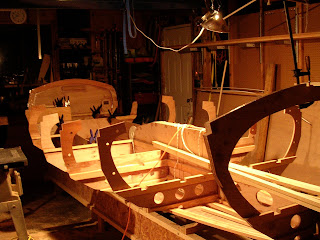Stories and boats: two things that aren't ever
quite done. The "Fear in the Desert" piece below continues to rankle me. So for a window into the craziness of revising, I'm going for a public self-flagellation.
Come with me, won't you, on a journey up the creaking attic stairs to the cobwebbed place, boarded-over and dark, where the darkness is crowded with shapes that may or may not be hungry.
Revisionland.
First step in revising is to go through and write angry and insulting notes to myself about practically everything. (Next time I'll look at fixing the problems; today the challenge is to find them.)
Here we go:
FEAR IN THE DESERT
The [
why 'the'? couldn't they be any curtains? seems needlessly specific] red and blue beaded [
this is an adj. may be stronger as a noun: curtains of beads] curtains swayed as the caravan lurched across the burning waste. A hand parted the fall of color [
have to admit, I love this], a hand [
repetition seems precious; too clever for its own good?] the color of dried leather [
great, implies mummies]. Three v-shapes of blue inked the spaces between the copper knuckles: three wolves’ heads.
On the hand was a falcon [
is this a tattoo too?] and the falcon flew [
evidently not. but the dreamlike language is distancing and makes things a little unclear. OK if intentional.] across the sand and rock. The curtain closed. Of this the driver, perched atop the caravan, heard nor saw nothing: a mute since birth, he had been blinded for this task. Rags of no color wrapped his head save for an opening at this nose, and he twitched his head, snuffing the air.
“The falcon will not return,” said the man who had released it. The figure facing him, nearly shimmering [
isn't it dark inside the caravan?] in the incandescent heat, made no response. He expected none, but for him this was a humor [
'a' humor seems contrived.].
“She will not,” he said again.
The figure was slight, hunched, and showed no skin nor, in fact, any sign of life. Over its head was draped [
passive voice] thin-woven [
isn't it enough to say 'thin'?]fabric that perhaps had once been patterned with a thousand tiny images, or words to a forgotten language.
The man pursed his lips. Ran his dry tongue across his yellowed teeth. Folded his hands so his left fingertips rested on the blue wolves’ heads.
He had been tempted, oh, how he had burned with temptation, to lift the thin [
word repetition] and faded fabric to see the passenger’s face. This passenger who had never spoken and who sat, day after day, in the darkened caravan while he performed the necessities to keep it alive. Keep it happy? Keep it subdued?
Alive, he decided.
“Faster, up there!” he called to the deaf driver. At this the figure leaned forward, as if it was going to rise, or even speak [
reverse; speak is less interesting than rise, so end with rise], and he tensed. When he realized it was falling he tightened his lips and, wrapping his hand into the deep indigo of his sleeve, pressed it back upright.
He jerked back. Even through the fabric he could feel it. Warm.
As he had a thousand times, across a thousand miles, he swallowed, stroked the wolves’ heads, and reached to pull back its hood. And as he had [
seems like a lot of As and Ds here. Clumsy wording], as he knew he would, he stopped.
Instead his hand went to a brass carafe stopped with a wooden plug. When he opened it the liquid smelled of salt and new milk [
almost evocative but mostly just weird.]. It was time [
melodramatic; makes me think of Thundercats or something equally cheesy].
He leaned forward and poured the unguent over the figure’s wrapped head. The liquid soaked the old cloth instantly, and it clung [
misplaced modifier: the liquid clung? even if correct it's unclear = no good.] to the figure’s features. He narrowed his eyes. Leaned forward. He could almost make out its face.
The fabric moved.
He was struck, motionless as stone.
The fabric moved as, under the ancient pattern, a mouth opened. The yawning hole was outlined [
passive] in faded colors through the wet cloth.
He breathed through his mouth. There was a smell, a strange and bad smell. Yet familiar.
He tried to swallow but his throat was too dry.
He raised his fingers and, shivering, [
wording sequence not quite right here. call out 'shivering' more with its own sentence?] pulled back the terrible veil.
